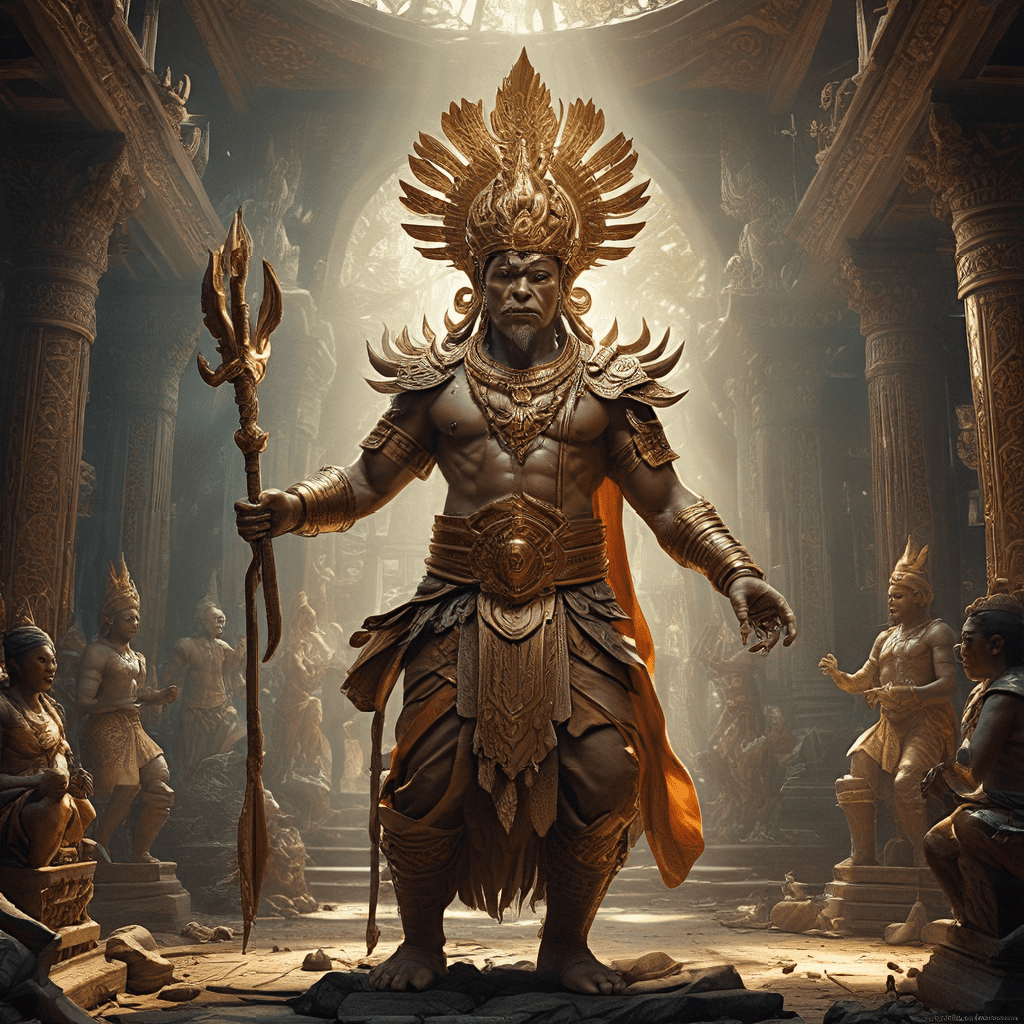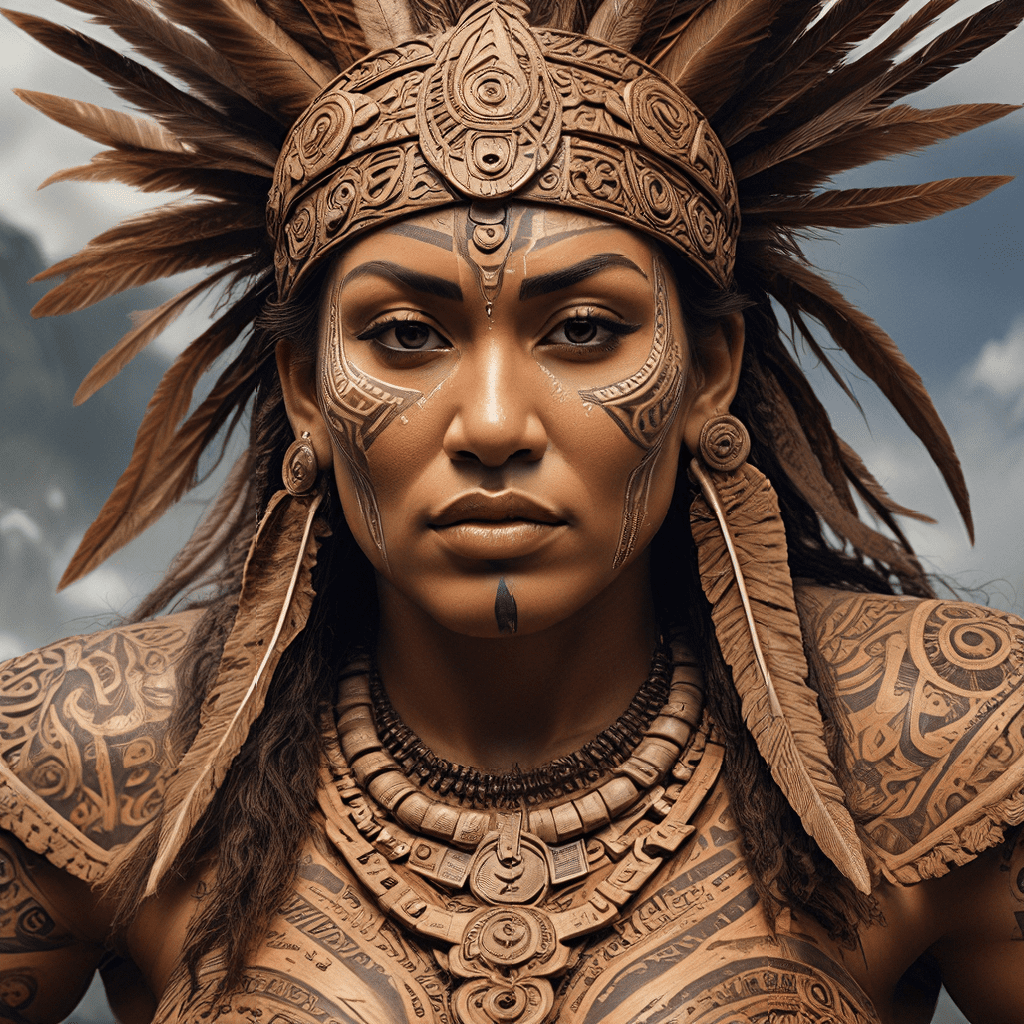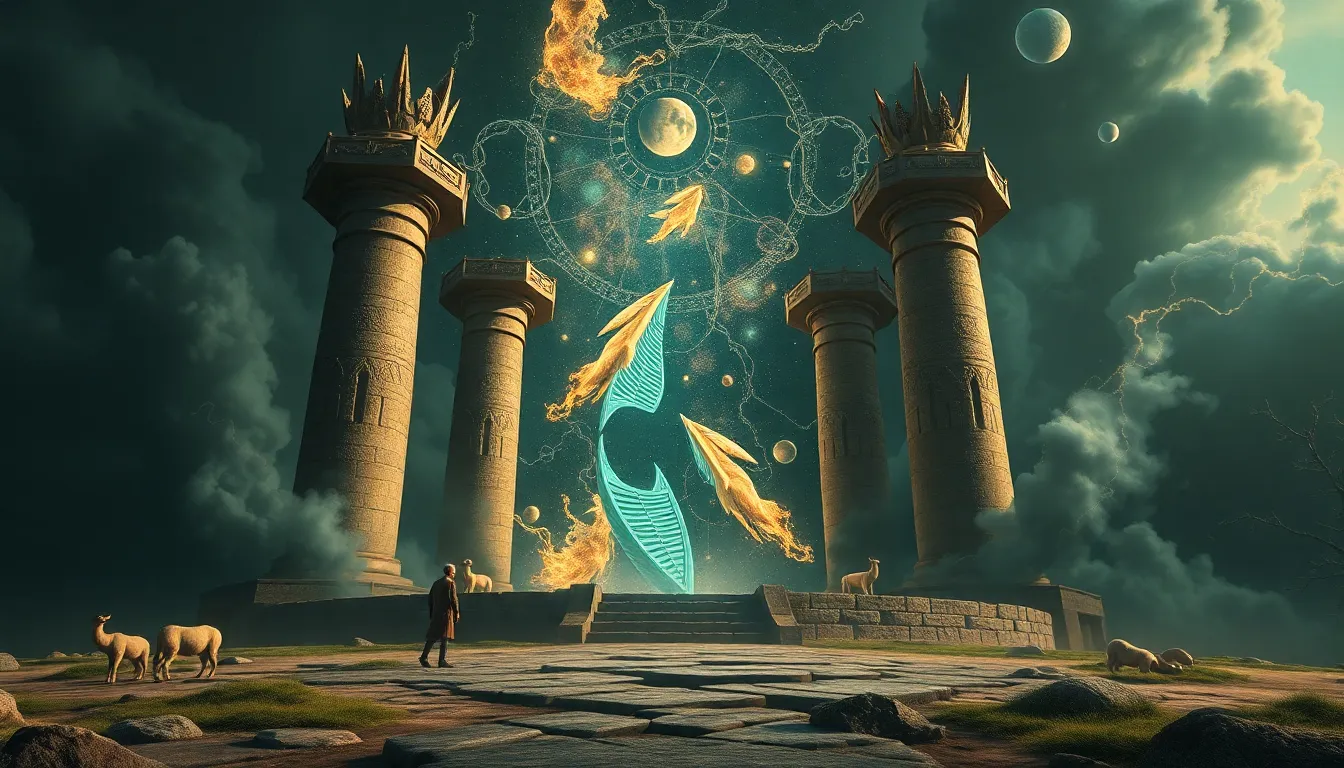Indonesian Mythology: A Tapestry of Beliefs
Indonesian mythology is a rich and diverse tapestry of beliefs, stories, and traditions that have been passed down through generations. These myths provide insights into the Indonesian worldview, their understanding of the universe, and their relationship with the divine. From the ancient animistic beliefs of the indigenous tribes to the influence of Hinduism, Buddhism, and Islam, Indonesian mythology reflects a fascinating blend of cultural influences.
Within this tapestry, the concepts of prophecy and destiny play a significant role. These beliefs are deeply intertwined with the Indonesian understanding of the divine, the power of spirits, and the nature of human existence. Exploring these concepts provides a deeper understanding of Indonesian culture, its values, and its worldview.
Prophecy and Destiny: Core Concepts in Indonesian Mythology
Prophecy and destiny are central themes in Indonesian mythology, shaping the narratives and worldview of the people. The concept of prophecy, or the ability to foresee future events, is often associated with gods, spirits, and certain individuals possessing special powers. These prophetic pronouncements can guide individuals, communities, and even entire nations.
Destiny, on the other hand, refers to the predetermined course of events that shape an individual's life. This concept is often linked to the belief in "takdir," a term that can be translated as "fate" or "divine decree." It is believed that one's destiny is preordained and cannot be altered, regardless of individual actions.
These concepts of prophecy and destiny are deeply intertwined in Indonesian mythology. While prophecies might offer glimpses into the future, they do not necessarily negate the power of "takdir." Even if a prophecy foretells a specific outcome, the individual's destiny may ultimately determine whether that prophecy comes to pass.
The Role of Gods and Spirits in Shaping Destiny
In Indonesian mythology, gods and spirits play a crucial role in shaping the lives of humans, often influencing their destinies. The pantheon of gods, influenced by Hindu and Buddhist beliefs, includes figures like Batara Guru (equivalent to Shiva), who represents the supreme power of the universe, and Dewi Sri (equivalent to Lakshmi), the goddess of abundance and prosperity. These gods are believed to be responsible for maintaining cosmic order, and their actions can have a significant impact on the lives of mortals.
Beyond the gods, spirits are believed to inhabit various aspects of the natural world, from mountains and rivers to forests and even household objects. These spirits, known as "roh" or "jin," have the power to influence human lives in various ways, from guiding individuals to influencing events.
The interaction between humans, gods, and spirits is a defining feature of Indonesian mythology. Prayers, offerings, and rituals are often employed to appease the spirits, seek divine guidance, and shape the course of one's destiny.
The Concept of “Takdir” (Fate) and Its Influence
The concept of "takdir," or fate, is deeply ingrained in Indonesian culture, influencing various aspects of life, from individual decisions to societal structures. The belief in "takdir" suggests that everything is predetermined, and human actions have limited influence on the ultimate outcome. This concept can provide comfort in the face of hardship, as it offers a sense of acceptance and resignation to the will of the divine.
However, it can also lead to passivity, as it can discourage people from taking responsibility for their actions and striving for change. This aspect of "takdir" has been a subject of debate and interpretation throughout history, with different schools of thought offering varying perspectives on the nature of free will and the role of individual effort.
The influence of "takdir" is evident in various areas of Indonesian life. For example, in the context of marriage, it is not uncommon for families to accept arranged marriages as part of their predetermined fate. In business and career choices, individuals may be more inclined to accept challenges and setbacks as part of their destined path.
Prophecies as Warnings and Guides
While prophecies may not always predict the future with perfect accuracy, they are often viewed as warnings or guides that offer valuable insights into potential outcomes. These prophecies can serve as reminders of the importance of living a virtuous life, following the guidance of the gods and ancestors, and making choices that are aligned with one's destiny.
Prophecies are often embedded within folktales, legends, and myths, acting as a source of wisdom and moral instruction. These stories serve as cautionary tales, highlighting the consequences of defying the will of the gods or neglecting one's responsibilities. By learning from the experiences of mythical figures and their encounters with prophecy, individuals gain a deeper understanding of the intricacies of fate and the importance of living a life in accordance with divine principles.
Mythological Figures and Their Prophetic Abilities
In Indonesian mythology, certain figures are renowned for their prophetic abilities, often acting as conduits between the human world and the divine. These figures can be gods, spirits, or even humans blessed with special powers. Their prophecies often serve as warnings, guides, or even pronouncements of destiny.
One prominent figure is Nyi Roro Kidul, the mythical Queen of the Southern Sea. She is often associated with the powerful waves and storms of the Indian Ocean. Legend has it that she can influence the lives of humans, granting favors or exacting revenge. Some believe she has the ability to predict future events, offering guidance to those who seek her favor.
Another notable figure is Sunan Kalijaga, one of the nine wali (saints) who spread Islam in Java. He is believed to have possessed the ability to see into the future and interpret dreams. His prophecies often focused on the well-being of the people and the future of the nation. Stories of his prophetic visions are found in local folklore and are passed down through generations.
Beyond these prominent figures, Indonesian mythology features numerous other characters with prophetic abilities. These figures, often associated with specific locations or events, are believed to offer guidance and warnings based on their connection to the spiritual realm.
The Power of Rituals and Offerings in Influencing Destiny
In Indonesian culture, rituals and offerings play a vital role in shaping destiny. These practices are seen as ways to communicate with the gods and spirits, seeking their favor and guidance.
Ceremonies are often held to mark significant life events, such as births, weddings, and deaths. During these ceremonies, prayers and offerings are made to ensure blessings from the divine.
Offerings are a crucial aspect of these rituals. They can be simple offerings of food or drink, or more elaborate gifts of flowers, incense, or even animals. The type of offering depends on the specific deity or spirit being addressed and the purpose of the ritual.
Traditional healers use specific rituals and herbs, believing they can influence the course of events and alleviate ailments. These rituals often involve chanting, prayers, and offerings to specific spirits or deities, seeking their intervention in healing.
These rituals are not merely symbolic gestures; they are believed to hold real power. By performing these actions, individuals believe they can influence the fates of themselves and their communities.
The Influence of Astrology and Numerology
Astrology and numerology have also played a significant role in Indonesian culture, influencing beliefs about destiny and the interpretation of events.
Astrology, the study of celestial bodies and their influence on human affairs, is widely practiced in Indonesia. Individuals often consult with astrologers to gain insights into their personalities, relationships, and future prospects.
Numerology, which assigns meanings to numbers and their significance in human life, is another important aspect of Indonesian belief systems. Numbers are believed to hold symbolic meaning and influence different aspects of life, from relationships to career success.
These practices are often incorporated into rituals and ceremonies, offering further avenues for understanding and navigating the complexities of fate.
Theories on the Origin and Development of Prophetic Beliefs
The origins of prophetic beliefs in Indonesian mythology are intertwined with the evolution of the country's cultural landscape.
Animistic beliefs, rooted in the reverence for nature and the spirits that inhabit it, likely played a pivotal role in fostering the development of prophetic beliefs. These beliefs emphasized the interconnectedness of humans and nature, fostering a sense of awe and respect for the unseen forces that govern the world.
Influence from Hinduism and Buddhism, which arrived in Indonesia centuries ago, further shaped the concept of destiny. These religions introduced the idea of a cosmic order, a system of karma and reincarnation that shaped individual lives.
Islam, which arrived in Indonesia around the 13th century, also contributed to the evolution of prophetic beliefs. The concept of Allah's will, "takdir," became deeply ingrained in Indonesian culture and influenced the understanding of fate, predestination, and the role of divine intervention.
Syncretism, the blending of different religious and cultural traditions, contributed to the unique and diverse nature of Indonesian prophetic beliefs. The blending of animistic beliefs, Hindu-Buddhist concepts, and Islamic teachings created a complex tapestry of beliefs that informs the understanding of prophecy and destiny in the modern day.
Modern Interpretations and Adaptations of Prophecy and Destiny
In contemporary Indonesia, beliefs about prophecy and destiny continue to evolve, reflecting the interplay between traditional beliefs and modern influences.
Modernization has brought about changes in the way people perceive fate and the role of prophecy. The rise of science and technology has led some to question traditional beliefs about the power of spirits, astrology, and numerology.
However, traditional beliefs remain strong in many communities, especially in rural areas where ancestral traditions are deeply rooted. These beliefs continue to influence decisions about marriage, business, and life choices.
Adaptations of prophetic beliefs can be seen in popular culture, literature, and the media. Modern narratives often incorporate elements of prophecy and destiny, reflecting the enduring power of these concepts in Indonesian society.
While the interpretations and adaptations of prophecy and destiny may differ across generations and communities, these concepts continue to play a significant role in the Indonesian worldview, shaping perspectives on life, death, and the interconnectedness of the human and spiritual realms.
FAQ
Q: What are some examples of prophecies in Indonesian mythology?
A: Indonesian mythology is filled with prophecies, often woven into folktales and legends. Some notable examples include:
- The Prophecy of the White Buffalo: This prophecy, from the Batak people of Northern Sumatra, predicts a time of great upheaval and change when a white buffalo will appear.
- The Prophecy of the "Borobudur" Stupa: Legend has it that the ancient Buddhist temple of Borobudur was built based on a prophecy, symbolizing the journey to enlightenment.
- The Prophecy of the "Tugu" (Monument): A prophecy in the Betawi region of Jakarta foretells that a "tugu" will be built near the port, signifying the city's future prosperity.
Q: How does the concept of "takdir" influence daily life in Indonesia?
A: The concept of "takdir" is ingrained in the Indonesian way of life. It can manifest in different ways:
- Acceptance of hardship: Fate is viewed as a preordained path, and difficult situations are often accepted as part of "takdir."
- Passivity in decision-making: Some may be less inclined to take risks or pursue ambitious goals, believing their actions have limited impact on their destiny.
- Emphasis on family and community: Close-knit family and community ties are seen as integral to navigating the unpredictable course of life, offering support and guidance.
Q: Is there any connection between prophecy and destiny in Indonesian culture?
A: Yes, prophecy and destiny are deeply linked in Indonesian culture. Prophecies are often seen as glimpses into the potential paths laid out by destiny. However, even if a prophecy foretells a specific outcome, the individual's "takdir" ultimately determines whether that prophecy comes to pass.



